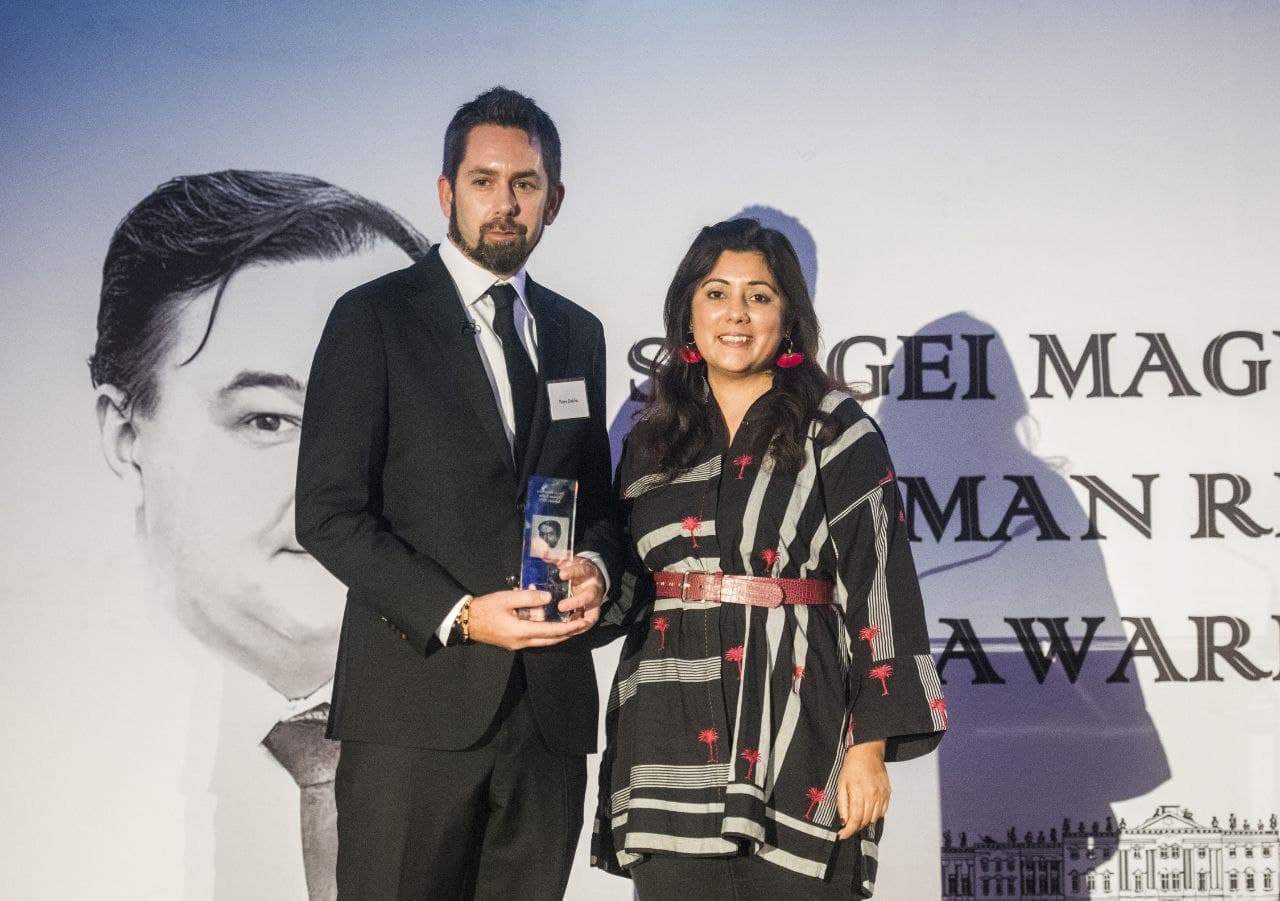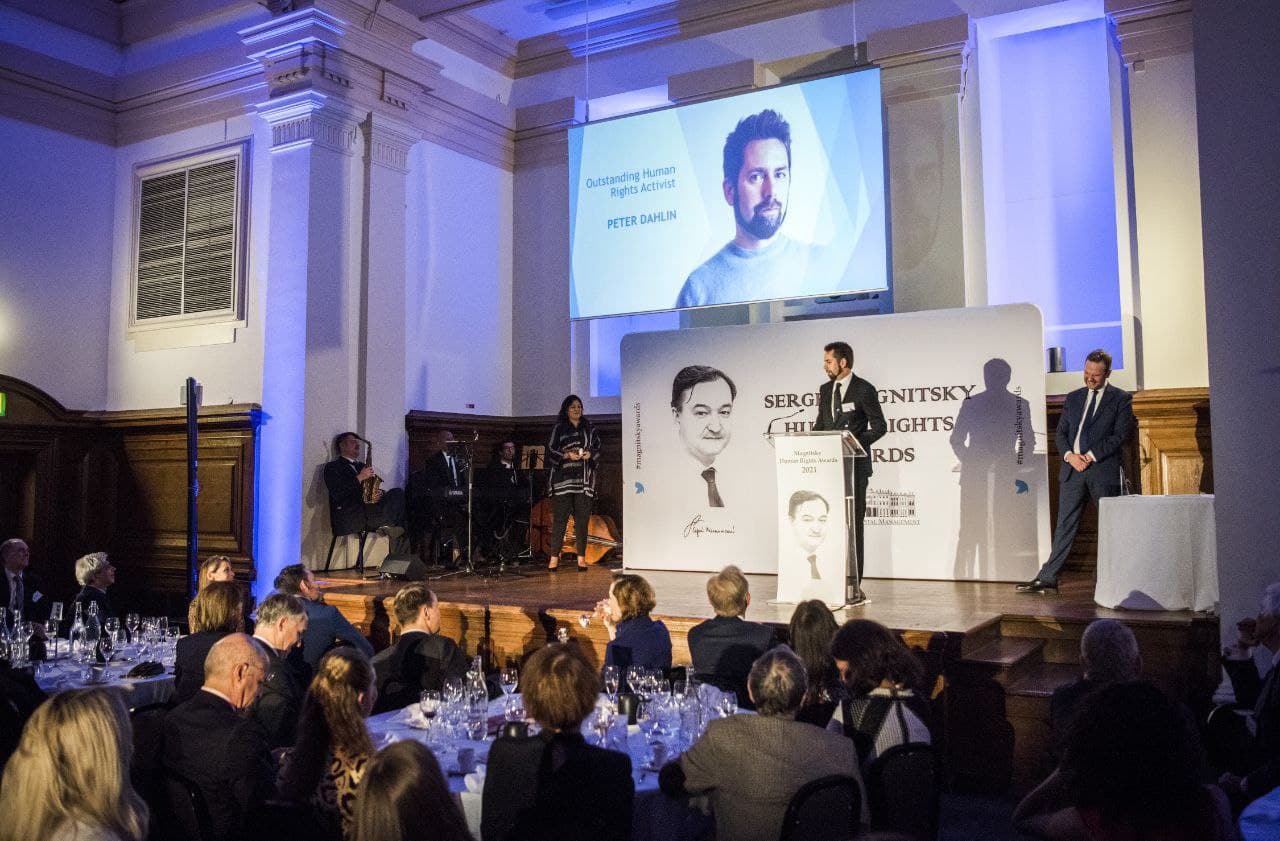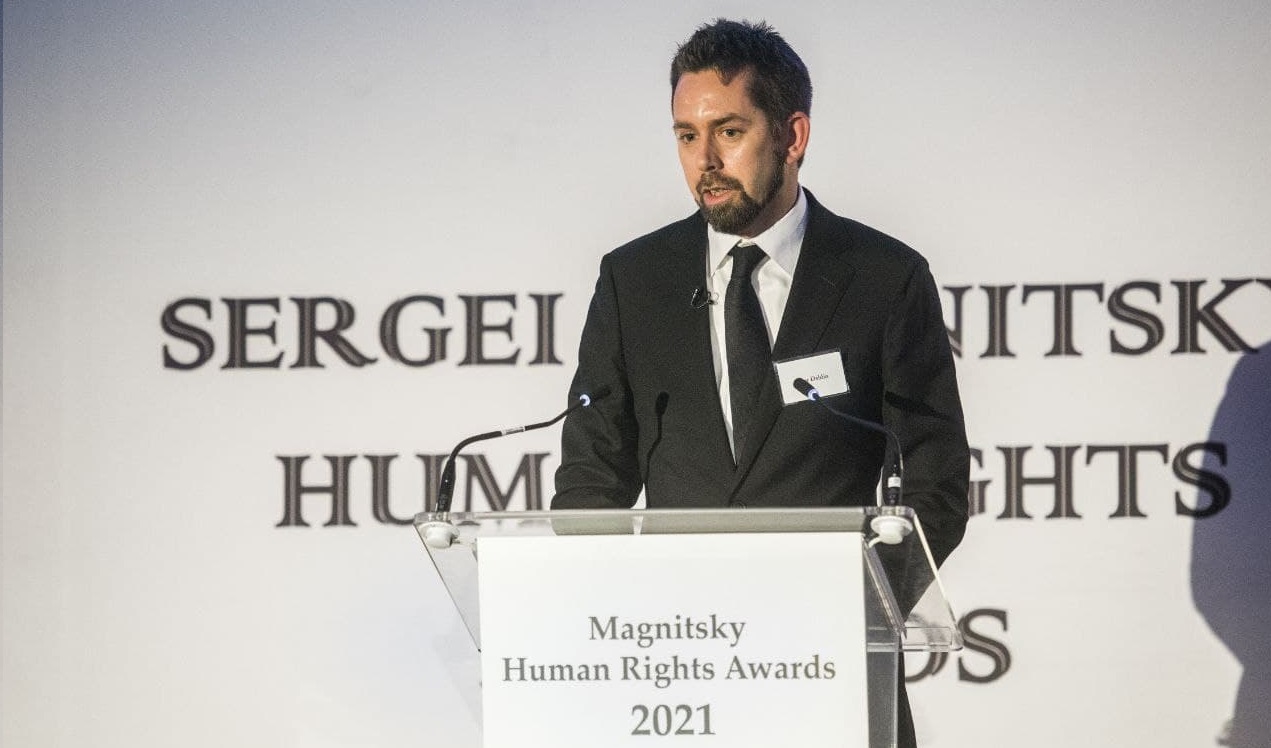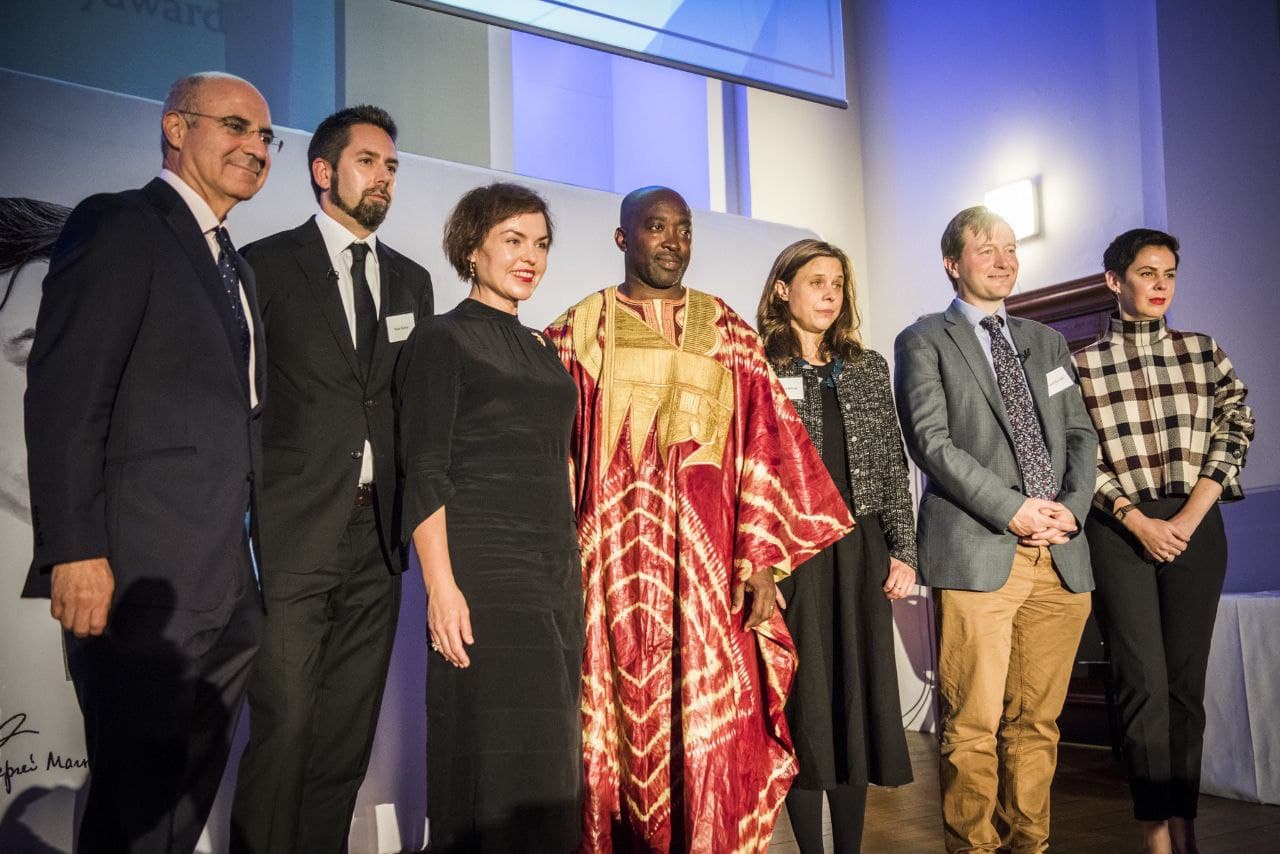SD wins award for ending China's forced TV confessions
As we approach the end-of-year holidays, we would like to wish all our supporters 'Seasons Greetings' and to share the happy news of an award we were given recently.
Safeguard Defenders founder Peter Dahlin received the 2021 Magnitsky Award for Outstanding Human Rights Activism in part because of our campaign against Chinese Party/State media, and its use of forced TV confessions. Former recipients of this award include activist and politician Nathan Law from Hong Kong, Saudi Arabian journalist Jamal Khashoggi, and 2021 Nobel Peace Prize Laureate journalist Maria Ressa of the Philippines.
The award comes as the world's attention has been focused on China and its disappearance of tennis player Peng Shuai after she posted online allegations of sexual assault by a high-level Party member. Her stage-managed appearances in media share similarities with China’s use of forced TV confessions, always extracted and aired before trial and often even before formal arrest.
Safeguard Defenders has played a pivotal role in exposing the detailed evidence of what goes on in these forced confessions -- torture, threats (in one case a victim's teenaged son was targeted), and scripts written and segments directed by police. Our groundbreaking research has been published in various reports and a book of victim testimonies (see here).
The 2021 Magnitsky Award was presented by British MP Nusrat Ghani to Peter Dahlin in a ceremony at Westminster Hall, London, on 18 November, organized by William Browder. In his speech, Peter declared the campaign, launched in late 2017, a success, pointing out the consequences of Safeguard Defenders' actions having directly led to CCTV and CGTN ending the airing of confessions internationally.

Published in English and Chinese, Scripted and Staged was the first comprehensive study of China's forced televised confessions. It led to much discussion within those communities that were the key targets of forced TV confessions – lawyers, journalists and civil society actors. Many of the victims, who had typically been held in incommunicado detention called Residential Surveillance at a Designated Location (RSDL), in detention and sometimes after serving a prison sentence, struggled to find work after their release. The public nature of the televised confessions had made others in the community distrust them. Our reports that exposed the reality with hard evidence -- showing how far police would go to stage such confessions -- helped to change the conversation. Once they understood that forced confessions were the result of police terror, they became more understanding and empathetic, which also helped in making forced confessions less useful to the police as one of its aims had been to fragment the human rights community by creating distrust. As a result, its use inside China has been scaled back: as far as we are aware no lawyers or journalists have been broadcast confessing on TV for nearly two years.
 Outside of China, Safeguard Defenders knew that CGTN was more concerned with its international prestige and right to broadcast its “perspectives”. This would always trump its need to air televised confessions. This was our leverage in getting them to stop airing confessions, at least internationally.
Outside of China, Safeguard Defenders knew that CGTN was more concerned with its international prestige and right to broadcast its “perspectives”. This would always trump its need to air televised confessions. This was our leverage in getting them to stop airing confessions, at least internationally.
So, our campaign focused on persuading TV regulators tasked with policing what and how TV channels may air in their respective countries, to put the pressure on CGTN and CCTV-4 (its international Chinese language arm). We worked with numerous victims to file individual complaints for violations; this led to a mounting level of fines levied against CGTN, and we also filed comprehensive complaints outlining the systematic nature of this violation – one where the media does not merely broadcast content given to them by police, but actually works with the police to help make them. The victims were held in solitary confinement at secret locations in the RSDL system – which Peter himself experienced.
CGTN lost its license to air in the UK following Safeguard Defenders' exposé that in 2018 direct control of CCTV and therefore also CGTN was moved from the Chinese State to the Chinese Communist Party. Political party-run TV is not allowed in the UK. It was also briefly taken down in Germany.
CGTN and CCTV-4 were then taken off the air in Norway, Sweden and by Australia’s public broadcaster SBS. A complaint is currently under review in Canada, and one week before the Magnitsky Award ceremony, Senate and Congressional leadership in the Congressional-Executive Commission on China (CECC) filed a letter to the US TV regulator, FCC, asking them to take action based on Safeguard Defenders' complaint.
Complaints have now also been filed to France’s CSA, where CGTN is licensed after it was kicked out of the UK.

In the early stages of the campaign, we held a press conference in London on 23 November 2018, to mark the publication of our book, Trial by Media. At the event, Peter Humphrey, a British citizen, former journalist, and victim of two such televised confessions, announced he had filed the first official complaint with the UK TV regulator. Immediately, as one CCTV insider later informed us, an emergency meeting was called at the CCTV headquarters in Beijing that lasted from Friday night until Sunday afternoon.
This was followed by several general complaints, individual complaints by other victims or their family members -- Swedish publisher Gui Minhai’s daughter Angela, and Hongkonger Simon Cheng, and an open letter, signed by a long list of Chinese victims, was released.
During his speech, Peter briefly outlined his own story, including his famed televised confession while held incommunicado in a secret RSDL jail. He stressed the ability that despite worsening repression in China, it was still very possible to achieve results in human rights in the country. Even so, many regional and international organizations have pulled out of direct engagement in China, placing an ever greater burden on local NGOs like Safeguard Defenders. He also stressed that strategic campaigning outside China could also yield results. Something which our forced confessions campaign has highlighted.
At the ceremony, Peter introduced Simon Cheng to the audience. Simon was one of the last victims of China's forced confessions. He noted that Peter Humphrey was the victim who helped launch this campaign, while Simon’s cooperation is what drove the final nail into CGTN’s coffin.

The global broadcast of forced TV confessions may have ended, but China abuses human rights on a massive, systematic scale every day and this includes stage-managed and coerced appearances. It is common practice for police to force detainees to fire their own lawyer (as in the case of Yu Wensheng, for example). Confessions continue to be filmed and posted on the police’s own social media accounts or on Party/State-owned news websites. CGTN posted an obviously fake email from Peng Shuai, even CCP ally, the International Olympic Committee, agreed to promote the news it had had video calls with Peng, without releasing them nor acknowledging the obvious fact that she was not free. During the early days of the pandemic, many people who were accused of spreading rumours online were paraded in videos on social media, or in the case of Li Zehua, who, while missing, had videos posted on his own Youtube channel to silence criticism.
The fight carries on and Safeguard Defenders will be there.
Our focus is on running campaigns that have a real impact, despite our small size and limited funding. Donations help expand our work and our impact. We appreciate any amount, if you can afford it.
So, this Christmas and Spring Festival, please consider a small monthly or one-off donation to support our work.
Some of Safeguard Defenders campaigns, many drawing on cutting-edge original research, include:
- Our long-standing campaign against the RSDL system for enforced disappearances, ranging from popular reports to detailed evidence submissions to UN bodies, using never before seen evidence collections which for the first time exposes the scale and scope of the system.
- Our new campaign against China’s National Supervision Commission (NSC) aimed at stopping international cooperation with the body, a non-judicial organ engaged in crimes against humanity.
- Mapping and exposing the use of the NSC’s system for arbitrary detention and enforced disappearances, via reports and evidence submissions drawing on original research to show, for the first time ever, the scale and scope of its use, and its rapid expansion.
- Stopping extraditions to China and suspending extradition treaties, in response to the near-collapse of legal safeguards and due process for suspects in China’s criminal justice system, and countering China's long extraterritorial reach, aimed primarily at depriving Chinese citizens abroad from exercising their basic human rights and democratic freedoms even in western countries.
- Uncovering China's misuse of INTERPOL and other international policing organs,
- Holding Chines human rights violators accountable, by detailed investigation of them and their crimes, and filing recommendations for Magnitsky- and other forms of sanctions against them, and,
- Many other smaller, targeted, campaigns past, present, and future.
